Zucchini is a common staple in many human diets—but what about your bearded dragon? Can bearded dragons have zucchini as part of a healthy meal plan? As a reptile owner, you want to ensure every bite your pet takes supports their health, energy, and long-term wellbeing. While some vegetables are packed with nutrients, others can do more harm than good.
In this article, we’ll explore whether zucchini is a safe and beneficial option for your bearded dragon. You’ll learn about its nutritional value, how to prepare it correctly, and how it fits into a balanced reptile diet. Whether you’re a new keeper or an experienced owner looking to diversify your dragon’s meals, this guide will help you make informed, expert-backed feeding choices.
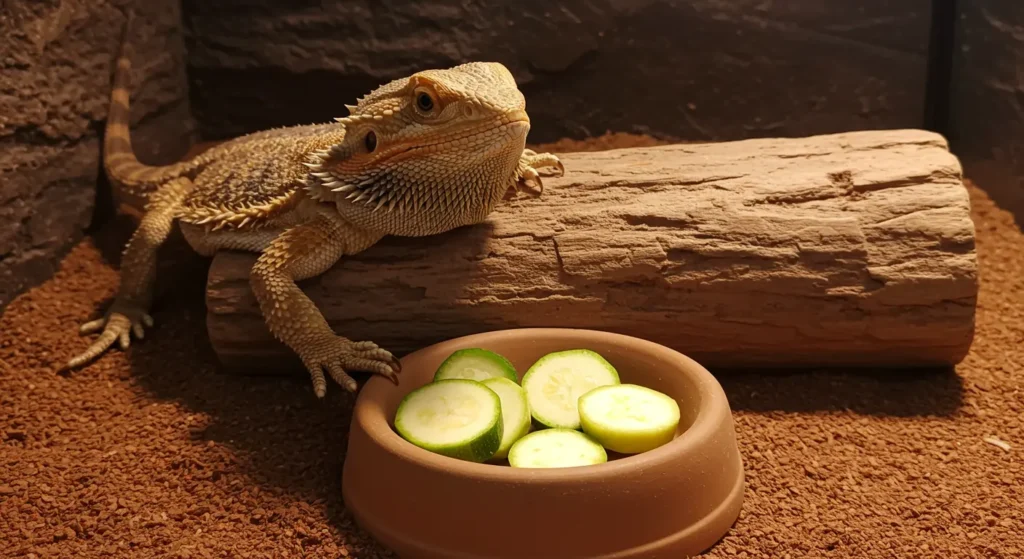
Can Bearded Dragons Have Zucchini? Understanding Its Role in Their Diet
Zucchini is often considered a light, water-rich vegetable—but when it comes to reptiles, not every veggie makes the cut. Before adding zucchini to your bearded dragon’s meals, it’s important to understand what it offers nutritionally and how it fits into a reptile’s diet.
Nutritional Profile of Zucchini for Bearded Dragons
Zucchini is low in calories and fat, making it a safe option in moderation. It contains a decent amount of vitamin C, potassium, and antioxidants. However, it’s not particularly rich in calcium, which is essential for bearded dragons. The calcium-to-phosphorus ratio in zucchini leans slightly toward phosphorus, meaning it shouldn’t be the main vegetable in their diet—but it can still contribute positively when rotated with more calcium-rich greens.
How Zucchini Fits into a Balanced Bearded Dragon Diet
Bearded dragons need a mix of leafy greens, occasional fruits, and protein (usually in the form of insects). Zucchini can be included in the vegetable portion of their meals, but it should not replace nutrient-dense staples like collard greens or dandelion greens. Its moisture content helps with hydration, especially in warmer climates, but balance is key.
Comparing Zucchini to Other Common Vegetables
When compared to vegetables like kale, mustard greens, or bell peppers, zucchini ranks moderately in terms of nutritional value. It’s safer than spinach (which is high in oxalates) but less beneficial than turnip greens. Its biggest advantage is its water content and digestibility, making it a gentle choice for occasional feeding.
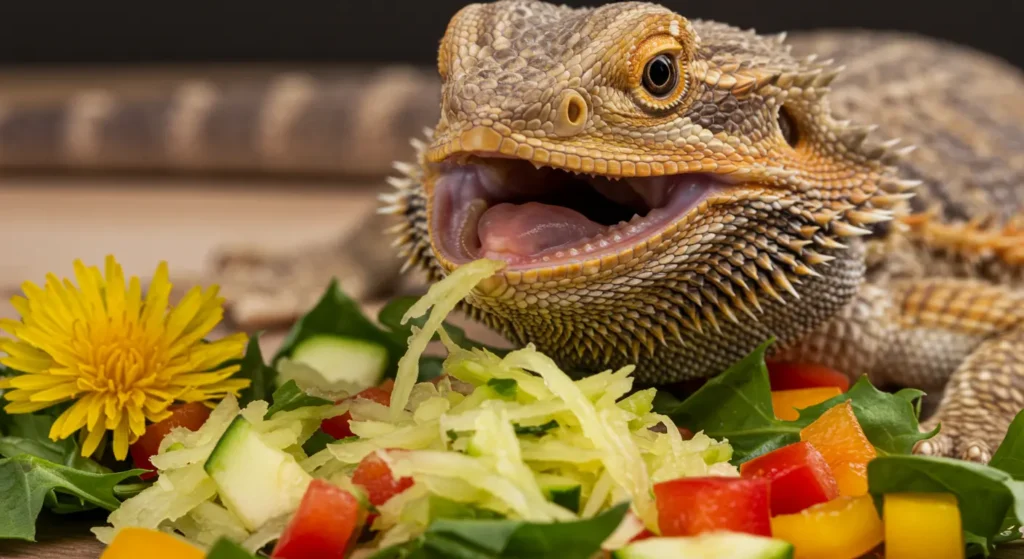
Why Zucchini Is a Great Veggie Choice for Your Bearded Dragon
Zucchini offers more than just hydration—it’s a soft, easy-to-chew vegetable that even picky dragons tend to enjoy. While it shouldn’t dominate the menu, it provides valuable variety and texture in their meals.
Health Benefits of Feeding Zucchini
Adding zucchini to your bearded dragon’s bowl can support hydration and digestive regularity. Its mild flavor and soft texture make it ideal for young or recovering dragons. When mixed with other greens, zucchini can stimulate appetite and increase overall food intake, especially in finicky eaters.
Essential Vitamins and Minerals in Zucchini
Zucchini contains several useful nutrients, including vitamin A (in the form of beta-carotene), vitamin C, potassium, and small amounts of folate. These nutrients contribute to healthy vision, immune function, and cell repair. While not a powerhouse veggie, zucchini can still play a supporting role in a well-rounded feeding plan.
How Zucchini Supports Digestion and Hydration
Thanks to its high water content (over 90%), zucchini can help keep your bearded dragon hydrated—especially in dry conditions. Its fiber is gentle on the digestive system and may help prevent constipation when used alongside other fiber-rich vegetables.
How to Safely Introduce Zucchini to Your Bearded Dragon’s Meals
Introducing any new food to a bearded dragon should be done gradually and thoughtfully. Zucchini is no exception. Offering it correctly ensures your dragon gets the benefits without the risks.
Preparing Zucchini for Feeding (raw, cooked, chopped)
Always serve zucchini raw. Cooking may reduce its nutrient content and increase moisture, which can lead to diarrhea. Wash it thoroughly, remove the skin if it’s too tough, and chop it into fine, manageable pieces to avoid choking. Grating it can also work well for smaller dragons.
Recommended Serving Sizes and Frequency
Zucchini should be served in small amounts, once or twice a week. Use it as a secondary vegetable, not the main component. A tablespoon of finely chopped zucchini is usually enough for adult dragons. For juveniles, even less is recommended.
Signs of Allergic Reactions or Digestive Issues
While rare, some dragons may react negatively to new foods. Watch for signs like runny stool, loss of appetite, or lethargy after feeding zucchini. If any issues appear, remove it from their diet and consult a reptile vet if symptoms persist.
What Other Vegetables Can Complement Zucchini in a Bearded Dragon Diet?
While zucchini is a safe addition, your bearded dragon’s diet should include a diverse mix of vegetables. Pairing it with more nutrient-dense greens ensures your dragon gets all the vitamins and minerals it needs.
Best Leafy Greens and Veggies for Bearded Dragons
Leafy greens should form the foundation of your dragon’s vegetable intake. Great options include collard greens, mustard greens, dandelion greens, and turnip greens. These provide calcium, fiber, and essential vitamins with minimal oxalates. Non-leafy but safe vegetables include bell peppers, squash, and carrots (in moderation). Herbs like basil can also be a flavorful addition—can bearded dragons eat basil? Yes, and here’s why they might love it. Rotating these with zucchini prevents dietary gaps.
Vegetables to Avoid Feeding Your Dragon
Not all vegetables are safe. Avoid spinach and swiss chard, which are high in oxalates that block calcium absorption. Iceberg lettuce should also be skipped—it’s nutritionally empty and mostly water. Vegetables like onions, avocados, and rhubarb are toxic to reptiles and should never be fed under any circumstances.
Combining Veggies for a Nutritionally Balanced Meal
Creating a mixed salad is the best way to ensure balance. Combine 2–3 nutrient-dense greens (like collards and dandelions) with small amounts of softer veggies like zucchini or shredded squash. This adds hydration, texture, and variety without overwhelming the diet with water-heavy ingredients. For young dragons, keep the veggie-to-protein ratio in check.
Expert Tips on Maintaining a Healthy Bearded Dragon Diet
A healthy bearded dragon diet depends on more than just good food choices—it’s also about ratios, supplements, and close observation. These tips will help you avoid common mistakes and keep your pet thriving.
Importance of Calcium to Phosphorus Ratio in Vegetables
Bearded dragons require a calcium to phosphorus ratio of at least 2:1 in their diet. Zucchini, like many other veggies, has more phosphorus than calcium, so it should be paired with high-calcium vegetables. Always dust feeder insects and veggies with a calcium supplement, especially if your dragon is still growing or laying eggs.
Role of UVB Lighting and Supplements in Nutrition
Even the best diet won’t be effective without proper UVB lighting. UVB exposure enables your dragon to synthesize vitamin D3, which is critical for calcium absorption. Without it, your dragon can develop metabolic bone disease. Use a high-quality UVB bulb and replace it every 6–12 months. Complement the diet with calcium and multivitamin powders, especially for indoor dragons.
Monitoring Your Bearded Dragon’s Health and Diet Adjustments
Watch for signs that your dragon’s diet may need tweaking. Common red flags include lethargy, poor appetite, soft or misshapen bones, and irregular bowel movements. Keep a feeding schedule and monitor weight regularly. Adjust the diet based on age, activity level, and health status. When in doubt, consult a reptile vet for a diet evaluation.
Conclusion: Can Bearded Dragons Have Zucchini? A Smart Addition When Used Right
So, can bearded dragons have zucchini? Yes—when fed in moderation and as part of a well-balanced diet, zucchini can be a healthy and hydrating treat for your bearded dragon. It’s easy to prepare, gentle on digestion, and adds variety to their vegetable intake. However, because of its low calcium content, it should never replace more nutrient-rich greens.
The key to a healthy dragon isn’t just one food—it’s variety, balance, and consistency. Zucchini works best when combined with high-calcium vegetables, proper supplementation, and essential UVB exposure. Always monitor your dragon’s behavior and adjust their diet as needed to keep them active, alert, and thriving.
By understanding the role of zucchini and other vegetables, you’re one step closer to providing your dragon with the expert care it deserves.

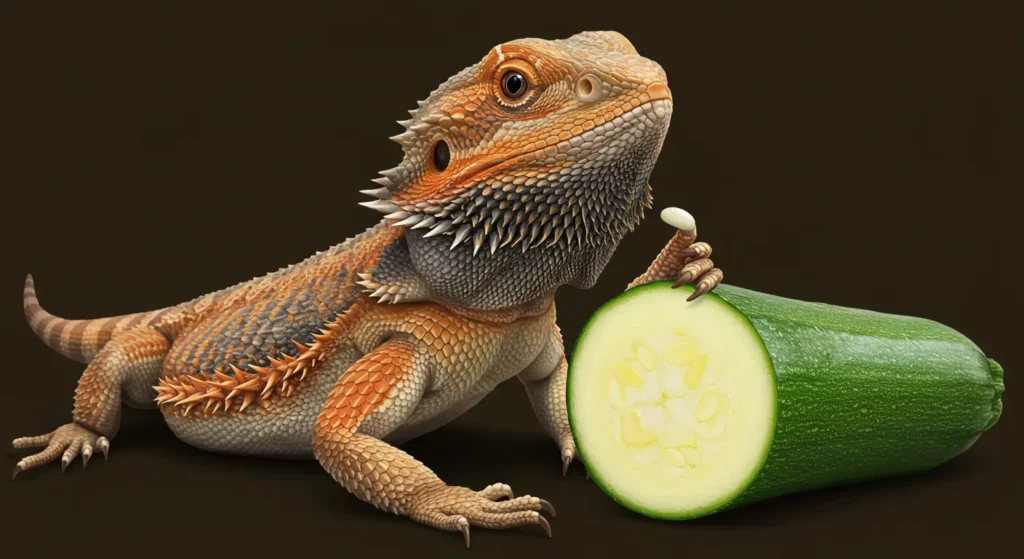


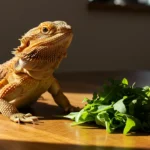

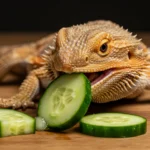
2 thoughts on “Can Bearded Dragons Have Zucchini? A Great Veggie Choice”